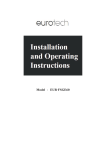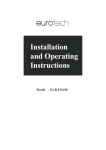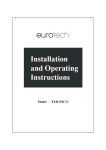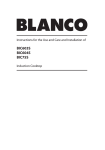Download Eurotech EDI604NF Instruction manual
Transcript
Instructions for use and installation Induction cooktop 17 EDI604NF EDI704NF EDI905NF 1 The Manufacturer strives for continuous improvements. For this reason, the text and illustrations in this book are subject to change without notice. 2 Dear customer! The built-in ceramic-glass cooktop is intended for household use only. Materials used for packaging are nature friendly and may be recycled, deposited or destroyed without any threats to the environment. In order to recognize these features, all packing materials are marked with relevant symbols. Once your appliance has become obsolete and you do not intend to use it any longer, take adequate care not to litter the environment. Deposit your old appliance with the authorized depot dealing with used household appliances. Instruction for use Instructions for use have been prepared for the user, anddescribe the particulars and handling of the appliance. These instructions apply to different models from the same family of appliances, therefore you may fi nd information and descriptions that may not apply to your particular appliance. Installation instruction The appliance should be connected to the power supply in accordance with the instructions from the chapter “Electrical connections” and in line with the standing regulations and standards. The connections should be carried out by a qualified personnel only. Rating plate The rating plate with basic information is located underneath the appliance. Fire hazard protection Appliances are allowed to be mounted on one side next to a high kitchen cabinet, the height of which may exceed that of the appliance. On the opposite side however, only a kitchen cabinet of equal height as the appliance is allowed. Important warnings Mounting the built-in cooktop Connection to the power supply Tecnical information Ceramic-glass cooktop Hob control Configuration of cooking zones Safety functions and error display Cleaning and maintenance of ceramic-glass hob 3 4 6 7 9 9 12-13 13-14 15 3 IMPORTANT WARNINGS • The appliance may be built-in and connected to the power supply only by a qualified technician. • Particular areas of the cooktop surface (adjacent to the hotplates) are hot during operation. Prevent the children to hang around the appliance and warn them properly against the danger of burns. • Hot oil ignites readily, so be sure have the preparation of such food (fries) under constant control. • Hotplates may not be left in operation empty, without any dishes on top. • Never use the appliance for heating the ambience. • Never use the ceramic-glass cooktop as a working surface. Sharp objects may damage the cooktop surface. • Never place any metal objects upon the induction hotplate, such as knives, forks, spoons, pot lids, and the like, as they may get very hot. • Preparation of food in aluminium or plastic cookware is not allowed. Never place any plastic objects or aluminium foil upon the cooktop surface. • In case any other appliances are plugged in the electric mains close to the cooktop, prevent the contact of the plug cable with the hot cooking zones. • Never keep any flammable or temperature sensitive objects, like cleaning agents, sprays, detergents, etc., below the appliance. • Never use cracked or broken ceramic-glass cooktop. In case you notice any visible cracks on the surface, cut the power supply immediately. • In case of any malfunctions, disconnect the appliance from the power supply and call service department. • Do not use high-pressure steam cleaner or hot steam to clean the appliance. • The appliance is manufactured in compliance with the relevant effective safety standards. • The appliance is not intended for use by persons (including children) with reduced physical, sensory or mental capabilities, or lack of experience and knowledge, unless they have been given supervision or instruction concerning use of the appliance by a person responsible for they safety. • Children should be supervised to ensure that they do not play with the appliance. • The hob can not be activated by external timers or remote controls systems. • Be careful not to drop objects or crockery on the ceramic glass's surface. Even light objects (e.g. a salt shaker) can crack or damage the ceramic plate. • If the appliance is built in over an oven with a pyrolytic system, it should not be operated while the pyrolytic process is in progress because it can trigger the overheating protection of the cooktop. • Don't connect the hob to the power supply with an extension cable or multiple sockets, because they don't assure a sufficient safety (e.g. overheating risk of multiple sockets). • After using the cooktop, disconnect it from the user’s interface. Do not trust the pot detector. • Connect the equipment to a permanent connection. IMPORTANT: Installation, assembly and electrical connections must be carried out by authorised qualified technician and in accordance with manufacturer’s installation instructions, local regulations, building codes, electrical wiring requirements and any other statutory regulations. For service and spare parts contact: Eurotech Design Limited 09 377 7523. The symbol on the product or on its packaging indicates that this product may not be treated as household waste. Instead it shall be handed over to the applicable collection point for the recycling of electrical and electronic equipment. By ensuring this product is disposed of correctly, you will help prevent potential negative consequences for the environment and human health, which could otherwise be caused by inappropriate waste handling of this product. For more detailed information about recycling of this product, please contact your local city office, your household waste disposal service or the shop where you purchased the product. 4 MOUNTING THE BUILT-IN COOKTOP Caution ! • To avoid any possible hazard, the appliance may be installed by qualified personnel only. • Panels and furniture lining of the kitchen cabinet receiving the hob must be treated with temperature resistant adhesives 100°C (otherwise they might be discoloured or deformed because of inadequate temperature resistance). • The cooking hob is intended for building into the worktop above the kitchen element of 600 mm width or more. • After the installation of built-in hob make sure that there is free access to the two fixing elements in front. • Suspended kitchen elements above the cooktop must be installed at such distance to provide enough room for comfortable working process. • The distance between the worktop and the hood must be at least such as indicated in the instructions for installation of the kitchen hood, but in no case it may be less than 700 mm. • The use of hard wood decorative borders around the worktop behind the appliance is allowed, in case the minimum distance remains as indicated on the installation illustrations. • Minimum distance between the built-in cooktop and rear wall is indicated at the illustration for the installation of the built-in cooktop. Built-in induction hob opening dimensions A B C D E F G H EDI604NF 580mm 510mm 560mm 490mm 50mm 10mm 50mm 5mm EDI704NF 770mm 510mm 750mm 490mm 50mm 10mm 50mm 5mm EDI905NF 900mm 510mm 880mm 490mm 50mm 10mm 50mm 5mm • Induction hob may be built into the 25 to 40 mm thick worktops. • Bottom kitchen element must not have a drawer. It must be fitted with a horizontal plate 20 mm away from the worktop bottom surface. Space between the plate and the hob must be empty and no objects may be stored or kept there. • Rear side of the kitchen element must also have a 50 mm high opening along the entire width of the element, and the front part must have an opening of no less than 5 mm. • Incorporation of the oven under the induction hob is permissible for ovens equipped with a cooling fan. Prior inserting the oven, it is necessary to remove the rear kitchen element panel in the area of the oven opening. Equally, the front part of the element must have an opening of no less than 5 mm. 5 Installing the foam gasket Before inserting the appliance into the opening in the kitchen worktop, the supplied foam gasket must be attached to the lower side of the glass ceramic (glass) cooking hob. Do not install the appliance without the foam gasket! The gasket should be attached to the appliance in the following way: ▪ Remove the protective film from the gasket. ▪ Then, attach the gasket to the lower side of the glass, approximately 2-3 millimetres from the edge. ▪ The gasket must be attached along the entire length of the glass edge and should not overlap at the corners. ▪ When installing the gasket, make sure that the glass does not come into contact with any sharp objects. Installation procedure • Worktop must be placed absolutely horizontal. • Suitably protect the edges of the cut aperture. • Connect the cooking hob to the mains power supply (see instructions for the connection of the cooking hob to mains power supply). • Put the supplied springs in their places. • Insert the hob into the cut aperture. • Press the hob firmly towards the worktop from above. CONNECTION TO THE POWER SUPPLY • Connections may be carried out by a qualified technician only. The earthing protection must comply with the standing regulations. • Connection terminals are revealed when the connection box cover is removed. • Prior any attempted connection check that the voltage indicated on the rating plate is in line with your home power supply. • The rating plate is located underneath the appliance. • The appliance is manufactured for use with the power supply voltage 220-240 V ~. • In order to make a fixed connection to the mains, insert an all-pole circuit breaker between the appliance and the mains. This device shall have a contact separation in all poles, providing full disconnection under overvoltage category III conditions. • Such appliances are allowed to be mounted on one side next to a high kitchen cabinet, the height of which may exceed that of the appliance. On the opposite side however, only a kitchen cabinet of equal height as the appliance is allowed. • Upon the completion of installation, live wires and isolated cables must be adequately protected against accidental touching. Basic adjustment of sensors to the ambience Upon each connection to the power supply the sensors of the appliance are automatically adjusted to the environment to ensure their proper function. All displays turn on and are fully illuminated for a few seconds. During the adjustment procedure the sensors must be free of any objects, otherwise the adjustment procedure will be interrupted until such objects are removed from the sensor surface. During this period the regulation of the cooktop is impossible. ATTENTION ! Before attempting any repairs on the appliance, disconnect the power supply. In accordance with the mains voltage the appliance should be connected in line with the attached diagram. The earthing wire (PE) must be connected to the terminal marked with the earthing symbol . The connection cable must lead through the relief safety device, protecting it from accidental pulling out. Upon the completion of installation switch all the hotplates on for about 3 minutes to check the proper functioning. 6 Installation diagram Connection may be carried out by means of: - rubber coated connection cables, model H05RR-F with yellow-green earthing cable; - rubber coated connection cables, model H07RN-F with yellow-green earthing cable. EDI604NF – EDI704NF EDI905NF TECNICAL INFORMATION Type Width Rated voltage Type of switch Cooking zones ( Ø, mm/W ) Forward left Rear left Forward central Rear central Rear right Forward right Total power (W) EDI604NF 580 EDI704NF 770 220-240V~ o 380-415V 2N~, 50/60 Hz EDI905NF 900 220-240V~ o 380-415V 3N~, 50/60 Hz Electronic sensors 160 , 1,4 200 , 2,3 (P=3,0) 200 , 2,3 (P=3,0) 160 , 1,4 7,4 250 , 2,3 (P=3,0) 160 , 1,4 200 , 2,3 (P=3,0) 200 , 2,3 (P=3,0) 160 , 1,4 10,4 P= EXTRA POWERFUL SETTING Hotplate function principle • Ceramic glass hob is fitted with three or four hotplates. Hob surface is completely flat and smooth, without edges to accumulate dirt. • The hob is fitted with high power induction hotplates. Heat is generated directly at the bottom of the dish, where it is most needed, without any losses through the ceramic glass surface. This way the required extent of energy is considerably smaller compared to traditional heaters, which operate on radiation principle. • Glass ceramic hotplate is not heated directly, but only by return heat transmitted by the dish. This heat figures as “remaining heat” after the hotplate is turned off. The induction hotplate generates heat from the induction coil, installed underneath the ceramic glass surface. The coil creates magnetic field at the bottom of the dish (which can me magnetized) which in turn originates whirling fl ows of current which then heat the hotplate. IMPORTANT! In case sugar or other heavily sweetened substance is spilled on the hotplate, wipe it immediately and remove the sugar residues with a scraper although the cooking zone is still hot, otherwise the hotplate may be damaged. Avoid cleaning the cooktop while the cooking zones are still hot, as you may damage the hob. 7 Appropriate cookware for induction hotplates • Induction hotplate will function perfectly only if appropriate cookware is used. • Dish should be in the middle of the hotplate during cooking. • The appropriate cookware is the one which enables induction, for example steel, enamel or steel alloy cookware. Pots made from steel alloy with copper or aluminium bottom, or glass pots are inappropriate. • If you use the pressure cooker (“economy pot”) keep it under close surveillance until proper pressure is obtained. Hotplate should fi rst operate on maximum power, then follow the manufacturer’s instructions and use the appropriate sensor to decrease the power. • When buying cookware, check if it bears the label “allows induction”. Cooking zones Ø 160 mm Ø 200 mm Ø 250 mm Min. pan bottom Ø Ø 110 mm Ø 150 mm Ø 180 mm Max. pan bottom Ø Ø 160 mm Ø 200 mm Ø 250 mm Magnet test Use small magnet to test if the dish bottom is magnetic. Only dishes where magnet sticks to the bottom are suitable for induction cooking. Dish recognition One of great advantages of the induction hotplate is dish recognition. Even if there are no dishes upon the hotplate, or the dish diameter is smaller than the diameter of the relevant hotplate, there are no thermal energy losses. When the hotplate is on, the power indicator displays letter “U”. If you place the dish over that hotplate within the following 10 minutes, the hotplate recognizes the dish and turns on to the preset power value. At the moment you remove the dish from the hotplate, power is suspended. If you place smaller dish upon the hotplate and it is recognized, the hotplate will only use the amount of energy required to heat the dish according to its size. Hotplate may be damaged if: • it is turned on and left empty, or an empty dish is placed on it; • you use clay dishes which leave scratches on the ceramic glass surface; • you fail to wipe the dish bottom dry prior placing it on the ceramic glass hotplate; heat induction is obstructed and the hotplate may be damaged; • you fail to use the appropriate dishes that can be magnetized: steel dishes, enamel or steel alloy dishes; induction hotplate will not function otherwise. Power regulation Heating power of the hotplates may be set at nine different levels. The following chart indicates illustrative use of each power setting. Power Setting 0 1-2 3 4-5 6 7-8 9 A P ENERGY SAVING TIPS Purpose Off, using remaining heat Maintaining warm food, slow simmer of smaller quantities Slow simmer (continuation of cooking after a powerful start-up) Slow cooking (continuation) of larger quantities, roasting larger chunks Roasting, browning Roasting Start of cooking, roasting Automatic initial setting Especially powerful setting for extremely large quantities of food • When buying cookware be careful in selecting size: pot diameter usually refers to the top edge of the dish, which is often larger than the dish bottom. • Steam-pressure pots (economic pots), which use pressure in tightly sealed interior, are especially economic, and save both time and energy. Shorter cooking time leaves more vitamins in food. • Always leave enough water in steam-pressure pots, otherwise it may result in overheating which may damage both the pot and the hotplate. • Always cover the cookware with lids of appropriate size. • Use such dish size to accommodate the quantity of food to be prepared. If you use excessively large pot for small amount of food, you will consume considerably more energy. 8 CERAMIC-GLASS COOKTOP 1.Induction hotplate rear left 3.Induction hotplate rear right 4.Induction hotplate front right 6.Induction hotplate front left 7.Hob control panel Hob control elements A. B. C. D. E. ON/OFF sensor of cooking zones Safety lock on/off and child lock sensor ON/OFF sensor of cooktop Sensor (-) of timer and cooking zone Sensor (+) of timer and cooking zone Hob control • After turning the ceramic glass hob on all displays come on for a moment. The hob is ready for operation. • The hob is fitted with electronic sensors which are switched on if you touch the relevant circle for at least one second. • Each sensor activation is followed by a sound signal. • Avoid placing any objects on sensor surface (possible error signalization_Er03). • Always keep the sensor surface clean. Activating the hob Touch the sensor (C) for at least one second. The hob is now active, and all hotplate power indicators indicate »0«, decimal dot is flashing. Now you need to select the next setting within 20 seconds, otherwise the hob switches off again. Turning hotplates on After turning the hob on using the sensor (C), within the next 20 seconds start one of the hotplates. • Touching the desired hotplate sensor (A), its relevant power indicator indicates »0«. • By touching sensors (E) or (D) set the desired cooking power from 1 to 9. 9 Continuous pressing of (E) or (D) sensors the power level is automatically increased or reduced. Another procedure is to change power in steps is by intermediate touching of relevant sensors. Setting is always possible for one hotplate only at the time. Power display indicates »0«, or „H“, depending on the existing temperature of the hotplate (see Section Remaining Heat Indicator). You can also turn the hotplate off prior the end of cooking and use the remaining heat, and save energy. Switching hotplates off • Selected hotplate must be activated. • Touching the sensor (D) set the power level to »0«. After 10 seconds the hotplate is turned off. Fast deactivation • Selected hotplate must be activated. • Press both (A of selected hotplate) and (D) sensors simultaneously, and the hotplate is immediately switched off. Switching the hob off • The hob can be switched off any time by pressing the sensor (C). Locking the control unit / child safety lock By activating the child lock protection you can stop the operation of the appliance, i.e. the use of hotplates, protecting the children from accidental start and eventual injury. Activating child lock • The hob is active. • Press sensor (B) for at least 2 seconds. Timer’s display showes the symbol ( o ) steady. Child lock is now activated. •If hob is turned off by mistake, lock function is active still the next turn on. Turning child lock off • If the hob is switched off, turn the hob on by pressing the sensor (C). Timer’s display showes the symbol ( o). • Press sensor (B) for at least 2 seconds. Child lock is now off. Remaining heat indicator Glass ceramic hob also features remaining heat indicator “H”. Hotplates are not heated directly, but through return heat radiating from the dish. As long as the symbol “H” is on after the hotplate was switched off, the remaining heat may be used for warming up food or for melting. Even when the symbol “H” disappears, the hotplate may still be hot. Be careful of burns! Extra powerful setting (hotplates marked “P”) Extra powerful setting may be additionally switched on for fast cooking on predisposed hotplates. This extra hotplate power is used for heating large quantities of food. After switching on, the extra power is activated for: • 5 minutes, then automatically switches back on to the maximum normal level 9. During the time extra power is activated, the power of other hotplates is limited. This is indicated on the power display by intermittently flashing the selected cooking level and limited power for a few seconds. Activating extra powerful setting 10 • First select the hotplate by touching its relevant sensor (A), and immediately after press the sensor (D) then press (E) . Extra powerful setting is on, and power indicator displays symbol “P”. Premature turning extra powerful setting off Touch the desired hotplate sensor, and immediately after press the sensor (D). Letter “P” disappears and the hotplate automatically switches to level 9. POWER MANAGEMENT SYSTEM The Power Management system distributes power between the available cooking zones arranged in pairs (such as figures on the side), providing maximum power at a cooking zone and automatically reducing the power available to the other one. The display of the second cooking zone alternates, for a few seconds, the power of cooking chosen and the limited power. In certain circumstances, the Extra powerful setting function may turn off automatically to protect the electronic components inside the hob. Safety switch off Maximum continuous operation of a particular hotplate is limited, and the duration is displayed in the above chart. When the hotplate is switched off by the safety mechanism, the indicator displays symbols “0”, or “H” in case there is any remaining heat left. In such cases switch the hotplate off by touching the relevant power setting sensor (D). Power setting Hours lapse prior safety switch off 1 2 3 4 5 6 7 8 9 8 6 5 5 4 1,5 1,5 1,5 1,5 Example: Set the hotplate to power level 5 and leave it operate for some time. If you do not change the above setting, the safety mechanism will switch the hotplate off after 4 hour. Protection from overheating Induction hotplate is also fitted with safety device against overheating which protects electronic parts from damages. This device operates on several levels. When temperature of the hotplate excessively rises, it switches on twostage fan. If this is not enough, extra powerful heating is deactivated, and finally the safety device either reduces the heating power of certain hotplates or turns them off completely. When the hotplate cools off, the full power of hotplate is again available. Timer Timer facilitates the cooking procedure by setting the period of hotplate operation, and it can also be used as alarm timer. Activating the timer • Touch the sensor (A) of the relevant hotplate. • By touching the (E) or (D) sensor select the power setting from 1 to 9. • Touch the sensors (D) and (E) to activate timer. Timer display indicates »00«. • By touching sensors (E) or (D) set the desired cooking time (from 01 to 99 minutes). After a few seconds timer starts operating. Timer controlled hotplate control lamp is on and is blinking. You can use timer to set exact cooking time for each hotplate at the same time. To speed up the timer setting keep the relevant sensors (E) or (D) constantly pressed. 11 Altering preset cooking time • You can change preset cooking time whenever you wish during the hotplate operation. • Touch the sensor (A) to select the desired hotplate. Decimal dot is on. • Touch the sensors (E) and (D) to activate the timer. • By touching sensors (E) or (D) set the new desired cooking time. Remaining cooking time You can display the remaining cooking time by touching the sensor (A) and then (E+D) or by activating at the same time again and again (D+E) keys, the time that will be showed is refered to to the zone that displays the dot blinking. Shorter residual time will be always shown on timer’s display: ▪ In case time is relative to a cooking zone, decimal point will flash at its display. ▪ In case time is relative to “alarm timer”, there is not decimal point flashing. Switching the timer off When the preset time expires a beep is heard which you can either turn off by touching any sensor or leave it to turn off automatically after 2 minutes. When the programmed time finish also the cooking zone turns off. Switching the timer of prior expiry of preset time: • Touch the sensor (A) to select the desired hotplate. Decimal dot is on. • Touch the sensors (E+D). • By touching the sensor (D) set cooking time to »00«. Timer function is off, but the hotplate continues to operate until you switch it off manually. Alarm timer function Timer can be used as alarm also if it is already employed in timer control of one of the hotplates. (The hob don’t turn off) Timer setting With the hob off: • Touch the sensor (C) to activate the cooking hob. • Touch the sensors (E+D) to activate the timer. • By touching sensor (E) or (D) set the desired time. Switching the alarm off When the preset time expires a beep is heard which you can either turn off by touching any sensor or leave it to turn off automatically after 2 minutes. If you want to switch the timer off prior expiry of preset time: With the hob off: • Touch the sensor (C) to activate the cooking hob. • Touch the sensors (E+D). • By touching the sensor (D) set cooking time to »00«. Alarm function is off. Simultaneously touch both sensors (E) and (D) and switch the timer off. • During the time the alarm is activated, timer can be preset for any hotplate. Configuration of cooking zones Prerequisites for configuration/deleting (configuration) All pans must be removed from cooking zones and one suitable for induction must be available. It’s possible starting configuration/deleting within 2 minutes after connection to power mains. Touch control and all displays must be turned off. Getting in configuration/deleting menu’ Hold the minus key (6) pressed. 12 Press all keys of cooking zones’ selection anticlockwise, starting off with the front right one (5-4-3-2). Every action is acknowledged by a signal tone: # Only one “beep” → correct selection # Double “beep” → wrong selection After the last action all induction displays turn on, where it’s displayed: # “-“ → it means configured zone # “C” → it means NOT configured zone Procedure of deleting configuration After getting in configuration/deleting menù: Hold the minus (6) and the plus (7) key pressed: “E” is displayed on the displays of all cooking zones. “E” keeps flashing until all cooking zones will be not configured. “C” will be displayed on all displays. Procedure of configuration After getting in configuration/deleting menu and completing deleting configuration: (During configuration phase all displays of cooking zones display “C”) Cooking zone to be configured can be selected by cooking zone’s selection key. “C” will start flashing on the corresponding display. Within 20 seconds a pan must be placed on the corresponding zone in the way that the cooking zone can detect the correct position. # If within 20 seconds cooking zone detects a pan the simbol “-“ will appear (cooking zone is correctly configurated); # If after 20 seconds cooking zone doesn’t detect a pan the letter “C” will appear; try again configuration procedure from the first point. This procedure must be applied to every cooking zone. Configuration menù stops: Automatically after the configuration of all cooking zones. Manually by pressing the key ON/OFF (1), if you want to configure only certain cooking zones. At the end of it it’s advisable testing hob to verify that the configuration is successful. Safety functions and error display. ERROR CODE ERROR DESCRIPTION INSTRUCTION MANUAL E blinking No error! Induction module configurations are deleted. No error! Cooktop must be configured. No error! Cooktop is configured. No error! Cooktop is being configured. Induction module over-temperature. Pan overheated. See cooking zone configuration. C C blinking E2 E3 E4 E5 Inadmissible operating point due to inappropriate pan material. Loss of magnetic properties of the pan bottom with temperature increase. Component part error on induction module. Induction module not configured or wrong configuration. Component part error on induction module. Missing communication between the control panel and induction module. See cooking zone configuration. See cooking zone configuration. See cooking zone configuration. Let the cooktop cool down. If the problem remains Contact authorized center for technical assistance - specify the error code. Use appropriate pan material. If the problem remains Contact authorized center for technical assistance - specify the error code. Configuration renewed. If the problem remains Contact authorized center for technical assistance - specify the error code. Contact authorized center for technical assistance - specify the error code. 13 E8 Component error on induction module. Power failure. Component part error on induction module. Mains overvoltage. Incompatible software version between the control panel and induction module. Fan failure. E9 Coil temperature sensor defect. EA Hardware error. EC Two induction module are assigned to the same control panel cookplace. EH No temperature change at the cook place after activation of cooktop within 5 minutes. Defect mains connection. Component part error on control panel. Component part error on induction module. Inappropriate pan. E6 E7 No display/function Cyclic bar display or Er31 o Er47 Er22 – ER22 ER03 or ER20 Cooking level back to 0. L Wrong control panel. Key evaluation defect, control panel switches off after 3,5-7,5 seconds. Continuous key activation, control switches off after 10 seconds. Liquid or cookware on glass above control. Component part error on control panel. Microcontroller faulty. Component part error on induction module. No error! Child lock activated. Contact authorized center for technical assistance - specify the error code. Contact authorized center for technical assistance - specify the error code. Contact authorized center for technical assistance - specify the error code. Contact authorized center for technical assistance - specify the error code. Contact authorized center for technical assistance - specify the error code. Delete total configuration and execute again. If the problem remains Contact authorized center for technical assistance - specify the error code. Cooktop has to cool down. If the problem remains Contact authorized center for technical assistance - specify the error code. Contact authorized center for technical assistance - specify the error code. Use appropriate pan. If the problem remains Contact authorized center for technical assistance - specify the error code. Contact authorized center for technical assistance - specify the error code. Contact authorized center for technical assistance - specify the error code. Clean glass ceramics. If the problem remains Contact authorized center for technical assistance - specify the error code. Contact authorized center for technical assistance - specify the error code. Contact authorized center for technical assistance - specify the error code. Deactivate child lock. 14 CLEANING AND MAINTENANCE OF CERAMIC-GLASS HOB Ceramic glass hob should be cleaned only when completely cooled down, preferably after each use, otherwise even the slightest stains remaining after cooking may burn into the hob surface with each following use. For regular maintenance of ceramic-glass hob use special cleansing agents, produced in such way to create protective film upon the surface. Before each use, wipe the dust and other particles from the hob, they may scratch the surface (Fig. 1). Fig.1 Caution: use of steel wool, abrasive cleaning sponges, and abrasive detergents can scratch the surface of the hob. The surface may also be damaged by the use of aggressive sprays and inappropriate liquid chemicals (Fig.1 and 2). Pattern marks can be erased by the use of aggressive cleansing agents or rough and damaged cookware bottoms (Fig. 2). Fig.2 Minor stains are removed with moist soft cloth; after that the surface should be wiped dry (Fig. 3). Water stains are removed with gentle vinegar solution, but you must not wipe the frame with it (certain models only), since it may lose its glow. Never use any aggressive sprays or limestone removers (Fig. 3). Major stains are removed with special ceramic-glass cleansers. Follow strictly the manufacturer’s instructions. Fig.3 Be careful to remove any remains of cleansing agent from the hob surface, otherwise they will be heated during the next use and can damage the hob (Fig. 3). Stubborn and burnt stains are removed with special ceramic-glass scraper. Be careful, however, not to touch the hotplate surface with the scraper handle (Fig. 4). Handle the scraper with utmost care to avoid injuries! Fig.4 Sugar and sugar containing food may permanently damage the ceramic-glass hob surface (Fig. 5), so the remains of sugar and sugar containing food must be scraped off from the hob surface immediately, when the hotplates are still hot (Fig. 4). Fig.5 Discoloring of ceramic-glass hob has no effect whatsoever on its operation and stability. In most cases, it appears as the consequence of burnt in food remains, or as a result of dragging pots and pans (especially aluminium or copper bottom cookware) across the surface, and such discoloring is rather hard to remove. Note: All described faults are mostly esthetical and do not affect directly the operation of the appliance. Remedy of such faults is not covered by warranty. 15 16 17 18 19 Aftersales customer care: Eurotech Design Limited Phone: +64 9 377 7523 Email: [email protected] LIB30534 20






























